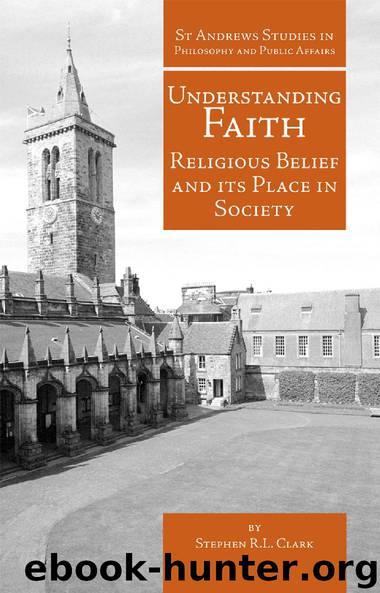Understanding Faith by Stephen R.L. Clark

Author:Stephen R.L. Clark
Language: eng
Format: epub
Tags: Philosophy, Religion, Militant Atheism, atheism, atheist, Moral Philosophy, Ethics, darwin, darwinian, evolution, apocalypse, God
ISBN: 9781845402877
Publisher: Andrews UK Limited 2011
Published: 2011-12-12T00:00:00+00:00
The Gradual and the Catastrophic
A personal God can do things ‘slowly’ as well as ‘quickly’. One reason that Darwinian evolutionary theory was attractive to so many, despite its scientific difficulties, was precisely that it made change gradual. The other ideological reasons for its popularity, that it seemed to provide a rationale for racist, imperialist and oppressively capitalist notions, were, perhaps, not entirely Darwin’s fault. His own loss of faith, after all, was triggered by his daughter’s death and expressed in horror at the abuse of power. If ‘the world of nature’, perceived as thoroughly unjust, is not the sort of world that a decent creator-god could make, then human injustice cannot be right either. Even the profiteer that Chesterton pilloried, as being ‘satisfied with himself, knowing that Nature is unjust’, should have known better. Those who condemn a creator-god’s indifference or cruelty should not themselves be cruel or indifferent. In rejecting the work of ‘our master, the selfish gene’ (as both T.H. Huxley and Richard Dawkins have sought to do), we are acknowledging that there is indeed a higher source of value (that is, that there is a God).
Geological discoveries were an earlier challenge to Biblical history. Some influential persons feared that if the Mosaic history turned out not be entirely accurate an amoral atheism would prevail, and the worst features of the French Revolution be the inevitable result. [46] Others proposed that Mosaic history could be essentially true, even though the world was older than it might at first have appeared. There were earlier ages, marked by the fossils of unfamiliar creatures, which seemed to have perished suddenly. The European imagination was very ready to see signs of the Flood, or perhaps of many such floods. Those worlds were swept away, by processes that might or might not sometimes be visible nowadays, and new biospheres created in their stead. Imaginative historians were divided on this matter. Some supposed that God had intervened ‘directly’ on such occasions; others that He had merely ordained that comets should do the work for Him, or that the way the continents were put together led, expectably, to their occasional collapse. In either case, the present state of things was not the only way things could be. In either case, they might suddenly be changed. Maybe the new worlds were entirely new. Or maybe they were developed from some seed, some remnant, from the older world they displaced. [47]
Darwinian Theory offered an alternative to Cuvier’s catastrophism: [48] there were no sudden changes, no discontinuities. It was enough that the world changed, that the character of populations changed, continuously (even though we could not always, or ever, find any records of these continuous changes). Each generation was just a little different from the previous one, and we could, in principle, conceive that all the generations of living things were a single, subtly varying population. Our hope for the future would be that subtle variations would continue. Some lineages might end abruptly, but all those that survived at all would suffer no sudden transformation.
Download
This site does not store any files on its server. We only index and link to content provided by other sites. Please contact the content providers to delete copyright contents if any and email us, we'll remove relevant links or contents immediately.
The Lost Art of Listening by Michael P. Nichols(7507)
Why I Am Not A Calvinist by Dr. Peter S. Ruckman(4154)
The Rosicrucians by Christopher McIntosh(3521)
Wicca: a guide for the solitary practitioner by Scott Cunningham(3180)
Signature in the Cell: DNA and the Evidence for Intelligent Design by Stephen C. Meyer(3140)
Real Sex by Lauren F. Winner(3025)
The Holy Spirit by Billy Graham(2954)
To Light a Sacred Flame by Silver RavenWolf(2824)
The End of Faith by Sam Harris(2744)
The Gnostic Gospels by Pagels Elaine(2536)
Waking Up by Sam Harris(2461)
Nine Parts of Desire by Geraldine Brooks(2370)
Jesus by Paul Johnson(2363)
Devil, The by Almond Philip C(2334)
The God delusion by Richard Dawkins(2312)
Heavens on Earth by Michael Shermer(2285)
Kundalini by Gopi Krishna(2187)
Chosen by God by R. C. Sproul(2165)
The Nature of Consciousness by Rupert Spira(2109)
